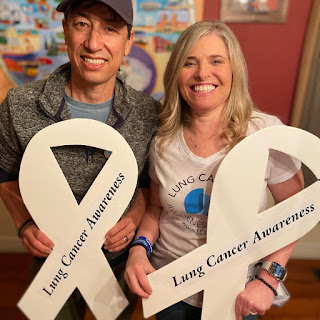My Story
I remember the exact moment as if it was yesterday. I was out for dinner with friends when my cell phone rang. It was my doctor from Massachusetts General Hospital, Dr. Lee Kaplan. I thought it was strange for him to call me at night. “Dave, it’s Lee. You need to come in to see me…we found a tumor on your lung.” My world stopped. I was a young, nonsmoker with boys were 5, 3 and 1 years old. This news stopped me dead in my tracks. If you've been diagnosed with cancer, or a loved one has, you know EXACTLY what I felt.
My life was forever changed. There were appointments with respiratory specialists, CT scans, MRIs, surgeons, and lots of time to worry “am I going to die?” After the lobectomy (removal of half of my left lung), came months of treatment and painful recovery. I kept telling myself, “one day at a time…one hour at a time…one minute at a time”. I am so thankful for my wife Missi who helped take care of me, while keeping things together for our family. It made me see the world differently. I am a cancer survivor. And to this day I am a passionate advocate for cancer research. That’s why I am proud to work at the National Foundation for Cancer Research (NFCR).
So here’s the challenge. Government funding of cancer research is declining, and the funding gap keeps getting wider. Brilliant scientists need philanthropic support to drive the pace of their work. I am head of development at NFCR, and we support amazing scientists committed to research for a cure. This year, I am also making a personal commitment to raise funds to support an extraordinary new technology that is setting the stage for real-time, noninvasive monitoring and personalized treatment of cancer. NFCR has supported scientist Daniel Haber, M.D., Ph.D. and his research collaborators at Massachusetts General Hospital since 2003. They have developed technology that can capture extremely rare “circulating tumor cells” (CTCs) from a patient’s blood sample. The CTC-chip is a new technology that is so sensitive that it can detect and capture one CTC out of a billion normal cells in the blood.
Wow, right?!
My life was forever changed. There were appointments with respiratory specialists, CT scans, MRIs, surgeons, and lots of time to worry “am I going to die?” After the lobectomy (removal of half of my left lung), came months of treatment and painful recovery. I kept telling myself, “one day at a time…one hour at a time…one minute at a time”. I am so thankful for my wife Missi who helped take care of me, while keeping things together for our family. It made me see the world differently. I am a cancer survivor. And to this day I am a passionate advocate for cancer research. That’s why I am proud to work at the National Foundation for Cancer Research (NFCR).
So here’s the challenge. Government funding of cancer research is declining, and the funding gap keeps getting wider. Brilliant scientists need philanthropic support to drive the pace of their work. I am head of development at NFCR, and we support amazing scientists committed to research for a cure. This year, I am also making a personal commitment to raise funds to support an extraordinary new technology that is setting the stage for real-time, noninvasive monitoring and personalized treatment of cancer. NFCR has supported scientist Daniel Haber, M.D., Ph.D. and his research collaborators at Massachusetts General Hospital since 2003. They have developed technology that can capture extremely rare “circulating tumor cells” (CTCs) from a patient’s blood sample. The CTC-chip is a new technology that is so sensitive that it can detect and capture one CTC out of a billion normal cells in the blood.
Wow, right?!
The next phase of the research will involve culturing CTCs collected from blood samples from patients with metastatic lung cancer. Lung cancer is the No. 1 killer for both men and women in the United States, causing nearly 30% of all cancer deaths each year. CTCs, which are representative of multiple tumor lesions in patients, can be sampled repeatedly over the course of a patient’s treatment, with minimally invasive blood draws. The CTCs can be analyzed in the laboratory, both to watch for changes that may occur and to evaluate the effectiveness of different drugs or drug combinations. This step prevents the need to test drug regimens directly in humans.
Culturing CTCs from patients with lung cancer will likely generate a far more refined picture of tumor composition than past technologies have produced. In addition, focusing on genetically directed treatments will help researchers identify potential mechanisms of disease resistance and effective drug combinations. Results of this laboratory research would lay the groundwork for better designed clinical trials and eventually better targeted treatments.
The technology of liquid biopsy is poised on the cusp of truly enabling personalized medicine – not just for patients with lung cancer, but for patients with a wide variety of cancer types – without the need for painful, repeated biopsies. Stay tuned for more details!
